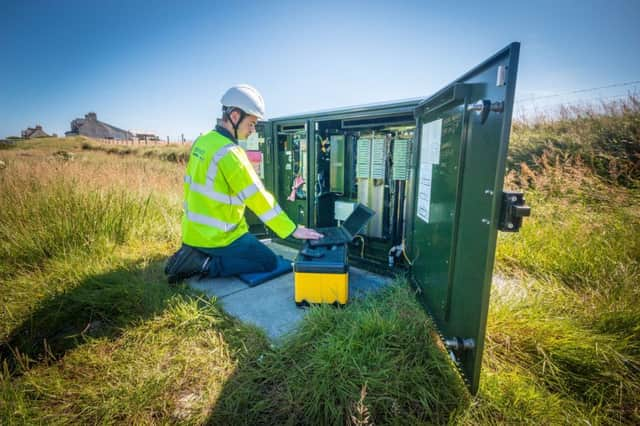Brexit vote a chance to '˜rebuild' Scotland's digital policy


But the consequences of political uncertainty could impact on the Scottish Government’s vision of superfast broadband - defined as speeds of 30MB per second or above - being available across the country by 2021.
Around 86 per cent of homes and businesses had access to fibre broadband by March this year, as part of a £410m Digital Scotland project with BT launched in 2013.
Advertisement
Hide AdAdvertisement
Hide AdReaching the more remote corners of Scotland are expected to be more challenging and costly, however, due to the high costs of building new infrastructure in sparsely populated areas.
Policymakers and industry experts gathered in Edinburgh on Wednesday to assess the feasibility of that vision in the wake of June’s Brexit vote and the renewed focus on a potential second referendum on Scottish independence.
There need for continued investment to ensure remote communities, particularly those in the Highlands and islands, were not left behind in a growing ‘digital divide’ was described as essential.
“We know the business case for fibre broadband in rural areas is highly sensitive to take-up, so demand stimulation is absolutely vital,” said Iqbal Singh Bedi, a principal at Analysys Mason, which provides specialist analysis on telecommunications and media affairs.
The impact of Brexit may force the UK Government to rethink its approach to broadband. As telecommunications is a reserved matter, this would likely have a knock-on effect on future Scottish Government plans.
The European Union is committed to providing 100MB per second speeds across the bloc by 2025, far outstripping the 2021 target in Scotland.
“With a hard Brexit looming, these targets may no longer be relevant,” added Bedi.
“Brexit or independence, whether you like them or not, present Scottish policymakers and the industry with the opportunity to craft an entirely new and different approach - an approach to policymaking that’s not focused on the generic European agenda and puts Scotland in poll position compared with its European rivals.”
Advertisement
Hide AdAdvertisement
Hide AdIf Scotland voted for independence in the coming years, the impact on digital broadband roll-out would be uncertain given the need to establish a new regulator.
“This could result in a cost increase in wholesale line costs largely because of the extensive number of rural lines in Scotland and the cost of maintaining that infrastructure,” said Bedi.
“From a retail and competition perspective, telecoms providers may pass higher costs onto consumers, resulting in higher prices.
“Alternatively, a Scottish Ofcom could reduce its costs, but that could effect the quality of its network.
“Neither of these are desirable outcomes, so a Scottish telecoms regulator may wish to review the method used to calculate wholesale costs.”
Fergus Ewing, cabinet minister for connectivity, said in a speech there was a need “to work closely with industry and academia in a collaborative way” when delivering the country’s digital future.
“We have purposefully set the bar high on connectivity,” he said. “We have made a headline commitment to have universal coverage by 2021, building on our existing Digital Scotland investment that is driving broadband access across the country.”